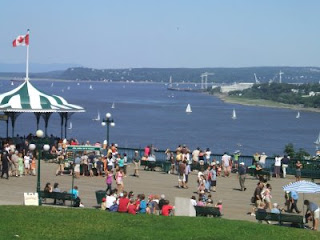
When Americans celebrate their beginnings, they do it with great enthusiasm and patriotism. Canadians often express more reserve and ambivalence.
 400 years ago, Samuel de Champlain birthed Quebec City, a name that he translated from an aboriginal word: ‘where the river narrows.’ Quebec City, the Iroquois village of Stadacona, became the earliest permanent city north of Mexico City and Florida established by Europeans. Many people don’t realize that Quebec City was once, jointly with Toronto, the Capital of Canada.
400 years ago, Samuel de Champlain birthed Quebec City, a name that he translated from an aboriginal word: ‘where the river narrows.’ Quebec City, the Iroquois village of Stadacona, became the earliest permanent city north of Mexico City and Florida established by Europeans. Many people don’t realize that Quebec City was once, jointly with Toronto, the Capital of Canada.
“I arrived there on the 3rd of July,” wrote Samuel de Champlain “when I searched for a place suitable for our settlement, but I could find none more convenient or better situated than the point of Quebec.” Champlain stepped ashore and unfurled the fleur-de-lys, marking the beginning of that city and indeed of Canada. “No other European colony in America, “commented the eminent historian Samuel Eliot Morison, “is so much the lengthened shadow of one man as Canada is of the valiant, wise, and virtuous Samuel de Champlain.”
Five years ago I was privileged to travel from Montreal to Victoria with 250 francophones and anglophones on a ‘La Danse’ tour of reconciliation.
I learned on that tour that Quebec itself is the heart of Canada, and Canada cannot live without her heart. Quebec has the anointing to release passion back into our nation.
This August, my wife and I were invited to a follow-up conference in Quebec City where 330 Canadian leaders celebrated the breakthroughs and healings that God has been bringing between francophones, anglophones, First Nations, Inuit, Métis, new immigrants, baby-boomers, gen-xers, and millennials. What a privilege it was to be in Quebec City to celebrate the 400th Anniversary!
This August, my wife and I were invited to a follow-up conference in Quebec City where 330 Canadian leaders celebrated the breakthroughs and healings that God has been bringing between francophones, anglophones, First Nations, Inuit, Métis, new immigrants, baby-boomers, gen-xers, and millennials. What a privilege it was to be in Quebec City to celebrate the 400th Anniversary!
 400 years ago, Samuel de Champlain birthed Quebec City, a name that he translated from an aboriginal word: ‘where the river narrows.’ Quebec City, the Iroquois village of Stadacona, became the earliest permanent city north of Mexico City and Florida established by Europeans. Many people don’t realize that Quebec City was once, jointly with Toronto, the Capital of Canada.
400 years ago, Samuel de Champlain birthed Quebec City, a name that he translated from an aboriginal word: ‘where the river narrows.’ Quebec City, the Iroquois village of Stadacona, became the earliest permanent city north of Mexico City and Florida established by Europeans. Many people don’t realize that Quebec City was once, jointly with Toronto, the Capital of Canada.“I arrived there on the 3rd of July,” wrote Samuel de Champlain “when I searched for a place suitable for our settlement, but I could find none more convenient or better situated than the point of Quebec.” Champlain stepped ashore and unfurled the fleur-de-lys, marking the beginning of that city and indeed of Canada. “No other European colony in America, “commented the eminent historian Samuel Eliot Morison, “is so much the lengthened shadow of one man as Canada is of the valiant, wise, and virtuous Samuel de Champlain.”
Champlain was born in 1567 in the town of Brouage, then a bustling seaport on the southwestern coast of France, some 70 miles (112 km) north of Bordeaux. His father was a sea captain and as a boy he became skilled at seamanship and navigation. Champlain later commented: “… (Navigation) is the art…which led me to explore the coast of America, especially New France, where I have always desired to see the fleur-de-lys flourish.”
(Navigation) is the art…which led me to explore the coast of America, especially New France, where I have always desired to see the fleur-de-lys flourish.”
 (Navigation) is the art…which led me to explore the coast of America, especially New France, where I have always desired to see the fleur-de-lys flourish.”
(Navigation) is the art…which led me to explore the coast of America, especially New France, where I have always desired to see the fleur-de-lys flourish.” Champlain cared deeply about the First Nations people, building lasting friendships with many groups. Pere Lalemant in 1640 wrote: ‘Would God that all the French, who were the first to come into these regions, had been like him!’
400 years later, Quebec City is more beautiful than ever. Thank God that there is a noticeable reconciliation happening between francophones and anglophones in Canada. Thank God that Quebec is more than ever an integral part of Canada. My prayer for those reading this article is that we may all celebrate the gift of our 400th Anniversary.
The Reverend Ed Hird+
Rector, St. Simon’s Church North Vancouver
Anglican Coalition in Canada










No comments:
Post a Comment